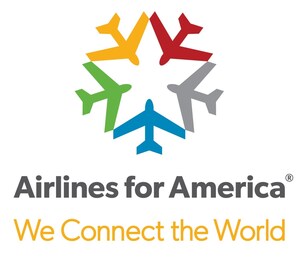WASHINGTON, Feb. 14, 2013 /PRNewswire-USNewswire/ -- Airlines for America (A4A), the industry trade organization for the leading U.S. airlines, today commended the International Civil Aviation Organization's (ICAO) Committee on Aviation Environmental Protection (CAEP) for its development of a new aircraft noise standard and for reaching the second of three milestones in the development of a first-of-its-kind carbon dioxide (CO2) standard for new aircraft. The recommendations, agreed to in CAEP meetings being held in Montreal, will be forwarded to the Council of ICAO for review and action during its sessions this spring.
(Logo: http://photos.prnewswire.com/prnh/20111201/DC15444LOGO)
"Our industry has a tremendous record of reduced noise and emissions, and we are committed to continuing that trend," said Nancy Young, A4A Vice President, Environmental Affairs.
CAEP recommended adoption of a new aircraft noise certification standard that would reduce the noise from new type design aircraft by 7 decibels (dB, specifically "effective perceived noise dB") relative to the Chapter 4/Stage 4 standard adopted by ICAO in 2001, which became effective in 2006.
"Federal Aviation Administration statistics demonstrate that we have reduced the number of people exposed to significant levels of aircraft noise in the United States by more than 90 percent since the late 1970s, even as we have tripled enplanements," Young said. "CAEP's recommendation of this new standard, which is even more stringent than the cost-effectiveness analysis supported, will bring further, significant noise reductions from the next generation of aircraft."
CAEP also made significant progress in its work to develop a CO2 standard for new aircraft, agreeing on the certification procedures that would be used for such a standard. Having completed the first two steps in creating a new environmental standard for aircraft, agreement to a metric system last summer and certification procedures at this CAEP meeting, CAEP can now turn to considering and assessing the stringency levels for the future standard.
"We commend the work of the Committee on Aviation Environmental Protection for its part in ensuring that ICAO continues to demonstrate leadership in setting environmental standards for global aviation," Young said.
A4A and its member airlines are committed to reducing greenhouse gas emissions from aviation and, with fuel-efficiency improvements saving more than 3.3 billion metric tons of CO2 emissions since 1978, have a strong record of meeting that commitment. By investing billions of dollars in fuel-saving aircraft and engines, innovative technologies and advanced avionics, the U.S. airline industry improved its fuel efficiency by 120 percent between 1978 and 2011, resulting in emissions savings equivalent to taking 22 million cars off the road each of those years. Even so, A4A supports additional advances in technology, operations and infrastructure to further reduce emissions and a global sectoral approach under ICAO as a framework for international aviation emissions measures. Learn more here.
ABOUT A4A
Annually, commercial aviation helps drive more than $1 trillion in U.S. economic activity and more than 10 million U.S. jobs. A4A airline members and their affiliates transport more than 90 percent of all U.S. airline passenger and cargo traffic. For more information about the airline industry, visit www.airlines.org and follow us on Twitter @airlinesdotorg.
SOURCE Airlines for America
WANT YOUR COMPANY'S NEWS FEATURED ON PRNEWSWIRE.COM?
Newsrooms &
Influencers
Digital Media
Outlets
Journalists
Opted In






Share this article